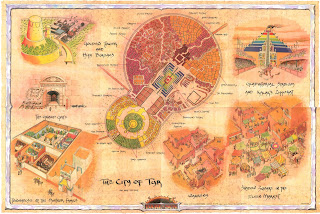 |
| Working ten hours for a single bit is better than being a slave. |
A gallon of water costs two bits, and a pound of rice, or a loaf of farro bread, is a single bit. With these costs, it seems a city dwelling citizen has a difficult choice of either starving to death or dying of dehydration. Then, there is the problem of getting clean on a world where water is scarce. So, we'll follow a young adult citizen of Kalak ruled Tyr, Kassem, as he goes about a normal day.
Kassem wakes to the sound of hollow wooden sticks being banged together by an employee of the templar order. The same thing would be happening up and down streets all over the city. Kalak demanded that his citizens be productive. Kassem lifts the canvas curtain covering his small glassless window. He sees the predawn sun turning the sky blue and knows he'll have to hurry if he wants his water ration before going to work at the mill.
Kassem dresses in his tunic, robe, and sandals. He carefully places his new cap, which Tyrians call a takiyye, perfectly on his head. He feels pride in his new red cap, even though it cost him two days of pay. Kassem is hoping to impress his widow neighbor, Yalda. Her husband was caught stealing and sent to the arena four months ago.
 |
| Map of Tyr |
When he approaches, Ghassan simply nods and allows him to pass. Kassem walks past the two Half-Giants guarding the well and pours water from the offered bucket into his half-gallon ceramic jug. He is careful not to spill any, as spilling the water could send him to the arena or have him enslaved.
After getting his daily water ration, Kassem hurries to the mill. He arrives just as the rising sun turns the blue sky green. Moving into position, he readies the chute to guide the ground farro needle flour into burlap and canvas sacks. The slaves have the more dangerous jobs and for that, Kassem is grateful. He's seen slaves grievously injured by the huge mill stones and beaten for spilling flour on the floor. He shouts to the miller that he is in position.
The hours pass quickly for Kassem. He'd been working at the mill since age twelve, so his work is second nature. Kassem is paid one bit every even numbered day and six cups of flour every odd numbered day. He makes sure to eat some of his flour and sip water throughout the day.
Unlike free citizen workers, who work outdoors, Kassem does not get to rest during the hottest part of the day. When his work is done, Kasssem is free to leave. The sun is a few hours from setting.
Kassem walks to the market. While he doesn't mind eating the bland farro flour paste he made, he is looking for something with flavor. He has a couple of bits in his pocket, as he's already set aside the five bits he pays in rent each month for his small home.
 |
| Small market in Tyr |
Returning to his home, Kassem pulls his canvas curtain and undresses. He rubs fine sand onto his sweaty body and scrapes it off with a rough bone. He had a cleaning brush, but it broke several weeks ago. He opens his robe and tunic and rubs sand into them as well. He then hangs them outside of his window and beats them clean. He cleans his cap carefully, rubbing sand only where it is dirty and brushing it off with the hem of his robe.
He dresses and makes sure that his cap is placed perfectly on his head. He gets his last bit of water, some flour, and crickets. He leaves his home and goes next door. He knocks gently and waits.
Unfortunately, no one seems to be home, as no one answers his knocks. Kassem is a little worried, but hopes that she is all right. He returns home and finishes his water. He saves the crickets, hoping to share them with Yalda tomorrow. He places his chamber pot outside, as many do in the poorer areas of the city. Slaves will come by in the night and take the waste to be used as fertilizer in the city's fields.
Kassem lays down on a canvas blanket and covers himself with his robe. His tunic serves as a pillow. Even though he is quite tired, Kassem takes a moment to reflect on his life. Although he is not wealthy, like the nobles, or powerful, like the templars, he is free, and freedom is worth the long work days and the bland food. In fact, Kassem thinks, freedom is worth any price.
I hope you enjoyed my little story. As always, comments and criticism is welcome.
2 comments:
good story, thanks
You are welcome. Thank you for stopping by to read my short story.
Post a Comment